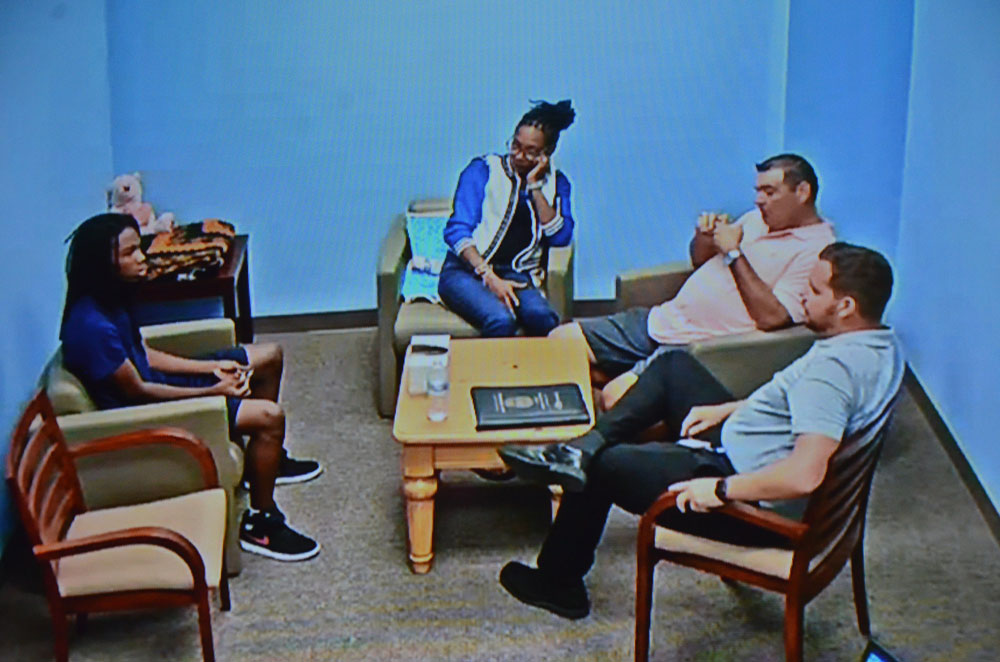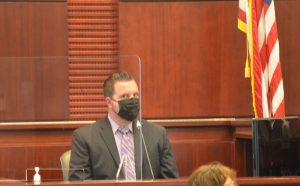
The prosecution in the first-degree murder trial of Benjamin Allen today showed a 56-minute edited video of Allen’s interview with detectives in the wake of the shooting death of Elijah Rizvan on July 12, 2019 in Palm Coast’s W-Section.
The video shows Allen, 16 at the time, in the room with his mother and her companion–he referred to himself as a “parent”– who, early in the interview, told detectives of Allen: “He’s hard-headed, he’s a pain in the ass, he’s no killer.” But it was his parents, not the detectives, who grew frustrated with Allen as the interview wore on, because he seemed to them less than forthcoming.
“The whole point is to be completely transparent, you can’t fool these guys. If they didn’t have something, Ben, we wouldn’t be sitting here,” the man tells him. But Allen is playing chess with the detectives, trying to guess their moves, gauge their evidence, stay ahead of them. He does not behave like a 16-year-old amazed or outraged that he’s being accused of anything, but like someone put out at having to explain himself.
He asked the detectives to show him what they had. When they wouldn’t, he told his parents the detectives had nothing. When the detectives showed him a clip of the car he rode away from the murder scene, with three friends, he said they didn’t have anything putting him at the scene.
He insists: his friends–Daryin Newsome, 19, at the wheel of the car he owned, and brothers Nicholas and Nathaniel Varol, 19 and 17 at the time–had driven him to the W Section to meet someone, but not to wherever it was the detectives were saying the murder took place. But he couldn’t say where it was he’d been dropped off, or to meet with whom.
“I had plans, I’m going to pick up tree” for $20, Allen said, using a slang word for pot. “He flakes.” Meaning his contact didn’t show. “After he flakes, my friends come and get me, we leave, they drop me off home.” He said he wasn’t paying attention to the roads, so he couldn’t give an exact address. It was one of four stories the trio of friends had told detectives separately before owning up to the lie and many others like it, and finally pinning the murder on Allen. Allen, who was not aware that his friends had provided numerous other stories, stuck to the one about being dropped off for less than two minutes and being picked up again.
“Ben, Ben, Ben, Ben, stop trying to be combative, OK?” the man who referred to himself as his parent told him. “You need to be transparent.”
When detectives and the man leave Allen alone with his mother in the interrogation room, shortly after his mother had spoken to detectives separately, his mother begs him to come clean. “I need to know. I need to know,” she tells him. “I need you to tell me–”
“Mom, that is the truth. What did they tell you?” Allen says, again angling to learn any scrap of information in the detectives’ hands.
“I cannot help you if you do not tell me the truth,” she tells him.
He again wants to know what they told her. “They’re not telling the truth,” he says. “We didn’t stop by a house,” he says. “No one sped out. We didn’t stop by a house.” All that, of course, is not true: not only the three others had finally conceded that they’d stopped at 7 Westford Lane, but Elijah Rizvan’s girlfriend, who was there, testified that a car with four occupants had stopped there, and two light-skinned one had gotten out and rushed her boyfriend right before the shooting. A Ring Doorbell video from a house a couple of doors down showed the car speeding off. Rizvan’s girlfriend’s shrieks were then audible as she walked up to him and he bled to death.
“Nothing happened,” Allen tells his mother.
His mother gets down on her knees, begging him for the truth. She cries. “Tell me the truth. Please.”
“That’s the truth,” Allen says. He never tells his parents or the detectives anything different.
The video jumps forward. By then he’s been handcuffed and told that detectives were securing a warrant for his arrest, and a search warrant was being served at his house. His parents and detectives had left the room. Allen is sobbing almost uncontrollably, his head on a coffee table or on the armrest of his chair.
“God damn it. Fuck, fuck, fuck,” he is heard saying. He sobs. He makes several unintelligible statements, says something about Newsome. But it’s never clear whether his despondency is the result of feeling wronged or realizing that he’s under arrest–not long before he’d been under the impression that he could walk out whenever–or that he felt found out. “I just want to be at my mom’s and my sister and I fucked it up.” He settles down. “Wow,” he says. “Mom, I’m so sorry. I’m so sorry.”
“I’m innocent until proven guilty. Innocent until proven guilty.” He keeps repeating the phrase, pacing back and forth in the room once before sitting back down and laying his head, then crying again. “It’s pointless,” he says.
Allen would later tell Circuit Judge Terrence Perkins that he and his lawyers, Baker and Gerald Bettman, had decided he would not be testifying. That 56-minute video, ending on his sobs and his own nihilistic conclusion, would be all the jury would get to see of Allen, other than the man, now 18, they’ve been seeing flanked by his attorneys at the defendant’s table, keenly attuned to every move in the courtroom yet remarkably still.
If the morning session before the all-white jury was dominated by Allen’s interview with detectives and his parents (his mother was in the courtroom today), the rest of the day was dominated by the testimony of Jorge Fuentes, the lead detective in the case who’d testified previously and was recalled by the prosecution. He was in the witness box most of the morning and part of the afternoon, the latter segments a tense and relentless back-and-forth between Fuentes and defense attorney Gary Baker as Baker went over every step of the investigation in an attempt to exploit flaws. Looking for the gun, which was never found, detectives had a pond near Allen’s house searched for three days but never searched the Intracoastal where the Varol brothers lived, right on the water. Detectives had gone through lie after lie with Newsome and the Varol brothers, one of them the same lie Allen had told, yet were ready to judge him the shooter without more evidence than what the brothers were saying.
The Varol brothers had lied and provided the wrong clothes to detectives when they sought them out for analysis. By the time the right clothes were secured, they weren’t even sent off for analysis. It was too late, Fuentes said. Allen’s clothes were analyzed. Nothing was found on them, even though the shooting, all agreed, took place at very close range.

The license plate reader showed the path of the car and video clips, the detective said. But that evidence is just as incriminating of the others, Baker said. And it was never established that the drug deal that went south was actually set up by Snapchat in Allen’s presence. The timeline would indicate that it had been set up before Allen was picked up by the other three. Fuentes conceded as much. “I have no record of when it exactly occurred and there were multiple people they were communicating with,” Fuentes said. SnapChat didn’t provide those records. They’d been deleted. When Baker asked Fuentes if he had no probable cause to arrest the other three, Assistant State Attorney Jennifer Dunton objected, and the judge sustained the objection.
“Would you agree with me that without the testimony of Nick Varol and Nate Varol, you have no probable cause to have arrested Ben Allen,” Baker asked Fuentes. Dunton objected again. This time the judge did not sustain. Baker thanked the judge–not surprising, considering the few times Baker was given the leeway he sought.
“The truth is without the testimony of Nick and Nate, you would not have any probable cause to even arrest Ben Allen.”
“I believe so, correct,” Fuentes, never once ruffled the entire day, said.
“And you would agree that to find Ben Allen guilty, a jury would have to believe their testimony beyond a reasonable doubt.”
“Right. Yes,” Fuentes said.
Baker was sowing a seed for closing argument and tying it to the lead detective. Those closing arguments begin at 9 a.m. Friday. A verdict is expected later in the day.
![]()






























Anyone's gain says
Sounds like they don’t have enough evidence to even say he’s the killer other than he said she said, no gun, clothes were never analyzed, shit partial video to much back and fourth could cause reasonable doubt, all the stories changed maybe they set Allen up, any way you look at this article it dosnt scream guilty, it screams lack of evidence
erobot says
Can he be tried as an adult for a crime he allegedly committed as a minor?
FlaglerLive says
He cannot be tried again for crimes related to this shooting.
Kim says
Appalled with all the lies. Praying that the Prosecutor and the Jury. Will make the right decision. That they will be
able to see through, the manipulative lies. 🙏 for truth and Justice. For Eli and his family. 😓💔🙏✌💞
Olga Rizvan says
That’s my first born grandson. I don’t believe the system worked. It is truly a gross injustice in the way that the defense lawyers and the prosecutor presented and handled
Elijah’s trial. How can you say probable cause, when 4 were involved, yet only 1 was arrested. You can tell they ALL lied. Who then killed my grandson, Elijah??? 😭